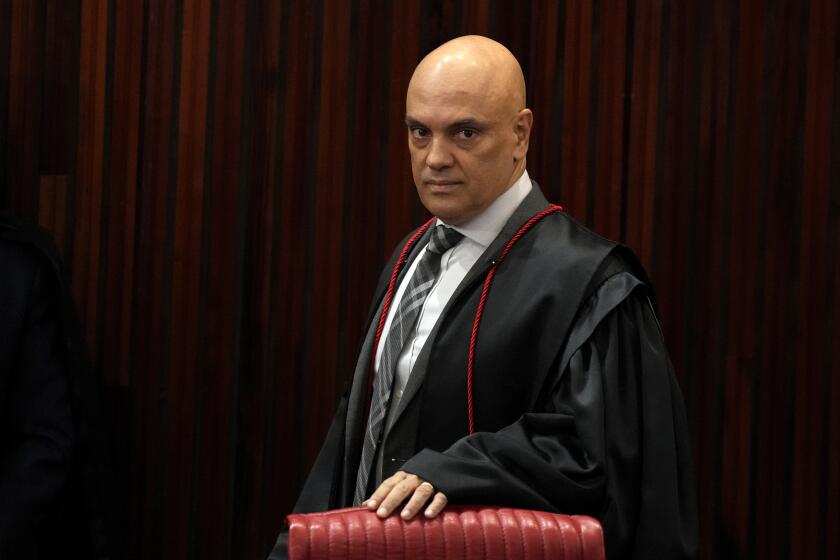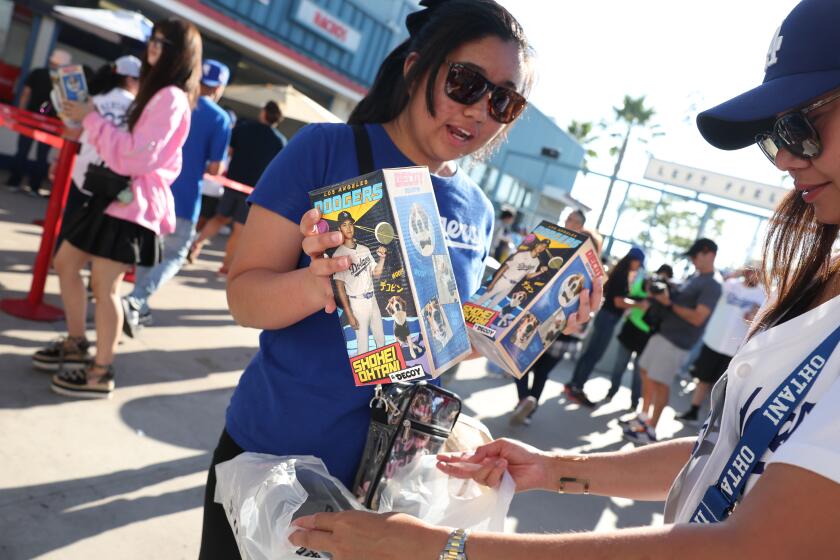HOME BUYERS FAIR : All About Escrow : Seeing a Sale Through to the End : Escrow: Regulators find little abuse of system that provides for a third party to hold deeds and cash for buyers and sellers of real estate.
The man at the order counter of Title Insurance & Trust Co. in downtown Los Angeles had a problem. After ordering a title report on a building site he was selling, he told clerJ. Beynon that he had to leave town for a few days.
“He asked us if we would . . . take his executed deed, deliver it to the buyer of his building lot, together with the certificate and send him the $1,000 that was owed him,” Beynon later wrote.
The year was 1895 and the first escrow in California--and the United States--had just been conducted.
Until the advent of escrow, California used the system still employed in many states, with attorneys representing both parties in the transaction and everybody seated around a table in a traditional closing.
Word got around about Title Insurance & Trust’s new service, and other customers who found it inconvenient to meet the other parties in a papers-round-the-table closing or were having problems clearing up the technicalities of their transactions asked for similar help, Beynon wrote in the April, 1928, issue of The TI News.
When Title Insurance & Trust organized an escrow department, Beynon and Elijah Unger became its first escrow clerks--and the first in the nation.
From that start almost a century ago, escrow has grown into an indispensable element of the state’s real estate industry, with about 13,000 escrow officers and clerks handling more than 500,000 new and existing home sales, property exchanges and real estate loan refinancings in a typical year.
Besides their primary task--holding documents and funds in real estate transactions until contractual conditions are performed--the state’s 1,212 independent escrow firms can make payments to contractors and suppliers in remodeling jobs and can handle escrows for personal property transactions, liquor license transfers and sales of businesses.
The rest of the state’s escrow providers--title companies, real estate broker escrow departments, bank and savings and loan escrow departments--are limited to handling escrows incidental to their primary function of providing title insurance, acting as a real estate agent or financing a real estate transaction.
Escrow is not required under California law, but as a matter of common sense and custom it is used to assure the buyer and seller of real estate that the money is handled legally and that the deed is recorded on the same day that the money is released.
Local customs and market conditions after World War II created differences in how escrow is handled in Northern and Southern California, according to Gwen Van Vleck, president-elect of the Orange County-based American Escrow Assn., a 6,000-member trade group.
“The postwar boom centering on Southern California and the accompanying large number of transactions and different sources of financing led to the creation of a more formal approach to escrow in the Southland, with the escrow opened at the beginning of the transaction and escrow officers following detailed instructions,” Van Vleck said.
She said that Northern California, where she has also handled escrows, adopted a less structured escrow system, functioning largely through the escrow departments of title insurance companies, with less detailed instructions and the escrow opened three or four days before the close of the transaction.
Despite the differences, the two escrow systems work equally well, according to Billie Sandlin of Integrity Escrow, Monrovia, president of the California Escrow Assn.
With a few major exceptions, escrow complaints are relatively uncommon, according to regulatory agencies.
Complaints about the state’s 1,212 independent escrow companies--all but 30 in the Southland--totaled 371 in 1988 and 345 in 1989, according to DiAun Burns, special administrator for escrow law at the Department of Corporations.
Burns said consumers’ complaints generally fall into five categories: excessive fees, including added-on documentary, warehousing and similar charges; escrows that don’t close on the date specified in the instructions; double payment of property taxes; lack of mutually signed cancellation instructions, and perceived poor business practices, including rudeness and lack of response to client inquiries.
The most publicized case of an independent escrow company gone awry occurred in March 1989, when the Department of Corporations seized the Encino-based Escrow Shoppe.
Among other charges, state officials alleged that the firm had made $3 million in unauthorized payments from one escrow account to another and that about $200,000 of customers’ funds were apparently missing. The estimate of missing funds soon was more than doubled and customers’ funds were frozen for three months.
Escrow Shoppe had about 350 pending transactions when it was seized. The firm is in receivership, Burns said, adding that 90% of the funds have been returned to the customers, with the other 10% still frozen pending resolution of the case.
Problems have been found recently among Southland real estate brokers who handle their own escrow transactions.
An audit of 30 Southland brokers by the Real Estate Department found that 86% of those examined were in violation of real estate law or a regulation of the real estate commissioner.
Formal action was recommended against 16 of the brokers when trust account shortages and other major violations were discovered, according to a report in the Department of Real Estate’s spring 1990 Real Estate Bulletin.
The 30 licensees audited by the Department of Real Estate had handled a total of 5,397 escrows in 12 months, supervising department auditor Danio Fajardo said. He said that seven of the broker account shortages ranged from $1 to $3,000; two licensees had shortages ranging from $3,001 to $10,000; four had shortages from $50,001 to $100,000 and three brokers had trust account shortages of $391,267, $178,876 and $109,952, respectively.
A total of $786,027 in account shortages was found, Fajardo said. The total amount of escrow funds held by the 30 brokers was $5,164,922 at the time of the audit, he said.
No information was available on complaints about or problems with escrow departments of banks and savings and loans.
Escrow fees vary from office to office and county to county, based on the selling price and the complexity of the transaction.
The escrow department of one large Southland title company quotes a $100 minimum charge and $2 per $1,000 selling price for both the buyer and the seller. Thus the fee on a $300,000 house would be $700 for each party in the transaction: The $100 minimum charge plus $600 ($2 times 300). Fees vary from company to company and from area to area, with the per-thousand-dollar charge ranging from about $1.50 to $2.25.
Most independent escrow companies are one-office operations, typically with half a dozen or fewer employees, according to George Lasko of Escrow Junction in Victorville, which is larger than most, with 21 employees.
In contrast to the single-office escrow firm is Spring Mountain Escrow Corp., Newport Beach, the nation’s largest independent escrow company, with 40 offices, from Ventura to San Diego County.
Spring Mountain handles about 22,000 escrows a year, according to Kim Sanderson, executive vice president.
Between Spring Mountain and single-office firms are companies such as Brentwood Escrow.
With offices in Brentwood, Marina del Rey, Pacific Palisades and Malibu, Brentwood handles about 3,000 to 4,000 escrows a year and has more than 50 employees, President Diana L. Stewart said.
Caseloads vary. Michael Marmarelli, vice president of escrow operations at Southern California Title Co., Van Nuys, said a normal load for an escrow officer is 100 escrows. “Depending on the type of escrow, the load can be more or less,” he said. “Exchange escrows, for instance, are more complicated than regular buyer-seller transactions.”
Stewart of Brentwood Escrow Inc., said her escrow officers handle 75 to 100 escrows at any given time.
“An escrow officer can handle more subdivision escrows at one time than individual escrows because with subdivision or tract escrows, she’s dealing with the same seller, the same product and essentially the same paper work,” Stewart said.
Escrow, handled primarily by title insurance company employees or firms called settlement companies that perform the functions of independent escrow companies, operates on California-style guidelines in nine other Western states--Oregon, Washington, Nevada, Arizona, Idaho, Colorado, Hawaii, Montana, New Mexico--and in Pennsylvania.
Unlike some states--Oregon and Washington, for instance--California has no licensing program for individual escrow agents. But escrow providers in California are supervised by five agencies: the Department of Corporations, Department of Insurance, Department of Real Estate, Department of Savings and Loan and Department of Banking.
Without individual licensing of escrow officers, many experts believe that membership in and certification by an escrow association is a good indication of professionalism.
MEMBERS OF THE CALIFORNIA ESCROW ASSN.
Type of Provider No. of Members Independent escrow companies 1,662 Title companies 1,186 Bank escrow departments 301 Real estate brokers 218 Savings & loan assns. 112
SOURCE: California Escrow Assn.
MORE READING ON ESCROW
Unless you’re considering escrow as a career, most books on the subject are too technical. An exception is “All About Escrow” by Sandy Gadow (P.O. Box 80824, San Marino, Calif. 91108, $12.95). The book is designed for the lay reader, but it is thorough, completer and treadable.
The CEA has a consumer leaflet, “Escrow: What it is . . .and How it Works for You,” available free by calling the association at (213) 461-7383.
More to Read
Inside the business of entertainment
The Wide Shot brings you news, analysis and insights on everything from streaming wars to production — and what it all means for the future.
You may occasionally receive promotional content from the Los Angeles Times.






